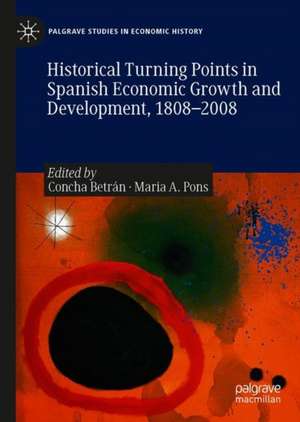Historical Turning Points in Spanish Economic Growth and Development, 1808–2008: Palgrave Studies in Economic History
Editat de Concha Betrán, Maria A. Ponsen Limba Engleză Hardback – 28 iun 2020
| Toate formatele și edițiile | Preț | Express |
|---|---|---|
| Paperback (1) | 941.82 lei 6-8 săpt. | |
| Springer International Publishing – 28 iun 2021 | 941.82 lei 6-8 săpt. | |
| Hardback (1) | 945.79 lei 3-5 săpt. | |
| Springer International Publishing – 28 iun 2020 | 945.79 lei 3-5 săpt. |
Din seria Palgrave Studies in Economic History
- 20%
 Preț: 939.27 lei
Preț: 939.27 lei -
 Preț: 357.88 lei
Preț: 357.88 lei -
 Preț: 497.34 lei
Preț: 497.34 lei - 17%
 Preț: 361.80 lei
Preț: 361.80 lei -
 Preț: 292.28 lei
Preț: 292.28 lei - 15%
 Preț: 580.36 lei
Preț: 580.36 lei - 20%
 Preț: 690.47 lei
Preț: 690.47 lei - 17%
 Preț: 361.38 lei
Preț: 361.38 lei - 18%
 Preț: 1012.53 lei
Preț: 1012.53 lei -
 Preț: 384.31 lei
Preț: 384.31 lei - 15%
 Preț: 587.85 lei
Preț: 587.85 lei - 15%
 Preț: 700.29 lei
Preț: 700.29 lei - 18%
 Preț: 782.42 lei
Preț: 782.42 lei - 15%
 Preț: 644.82 lei
Preț: 644.82 lei -
 Preț: 232.82 lei
Preț: 232.82 lei - 18%
 Preț: 899.21 lei
Preț: 899.21 lei - 18%
 Preț: 786.66 lei
Preț: 786.66 lei -
 Preț: 397.97 lei
Preț: 397.97 lei -
 Preț: 388.90 lei
Preț: 388.90 lei - 18%
 Preț: 737.57 lei
Preț: 737.57 lei -
 Preț: 387.20 lei
Preț: 387.20 lei - 15%
 Preț: 647.73 lei
Preț: 647.73 lei - 15%
 Preț: 646.62 lei
Preț: 646.62 lei -
 Preț: 422.90 lei
Preț: 422.90 lei - 18%
 Preț: 955.40 lei
Preț: 955.40 lei -
 Preț: 419.06 lei
Preț: 419.06 lei - 15%
 Preț: 459.06 lei
Preț: 459.06 lei - 15%
 Preț: 712.22 lei
Preț: 712.22 lei - 18%
 Preț: 787.47 lei
Preț: 787.47 lei - 18%
 Preț: 1128.57 lei
Preț: 1128.57 lei - 18%
 Preț: 949.55 lei
Preț: 949.55 lei - 15%
 Preț: 471.53 lei
Preț: 471.53 lei - 15%
 Preț: 640.88 lei
Preț: 640.88 lei - 18%
 Preț: 898.26 lei
Preț: 898.26 lei - 18%
 Preț: 1394.21 lei
Preț: 1394.21 lei - 18%
 Preț: 730.47 lei
Preț: 730.47 lei - 15%
 Preț: 711.56 lei
Preț: 711.56 lei - 18%
 Preț: 783.98 lei
Preț: 783.98 lei - 18%
 Preț: 900.01 lei
Preț: 900.01 lei - 18%
 Preț: 896.08 lei
Preț: 896.08 lei - 15%
 Preț: 705.83 lei
Preț: 705.83 lei - 18%
 Preț: 787.15 lei
Preț: 787.15 lei - 15%
 Preț: 704.69 lei
Preț: 704.69 lei - 18%
 Preț: 1112.48 lei
Preț: 1112.48 lei -
 Preț: 384.31 lei
Preț: 384.31 lei
Preț: 945.79 lei
Preț vechi: 1153.39 lei
-18% Nou
Puncte Express: 1419
Preț estimativ în valută:
180.99€ • 189.20$ • 152.94£
180.99€ • 189.20$ • 152.94£
Carte disponibilă
Livrare economică 14-28 februarie
Preluare comenzi: 021 569.72.76
Specificații
ISBN-13: 9783030409098
ISBN-10: 3030409090
Pagini: 269
Ilustrații: XIII, 267 p. 22 illus.
Dimensiuni: 148 x 210 mm
Greutate: 0.45 kg
Ediția:1st ed. 2020
Editura: Springer International Publishing
Colecția Palgrave Macmillan
Seria Palgrave Studies in Economic History
Locul publicării:Cham, Switzerland
ISBN-10: 3030409090
Pagini: 269
Ilustrații: XIII, 267 p. 22 illus.
Dimensiuni: 148 x 210 mm
Greutate: 0.45 kg
Ediția:1st ed. 2020
Editura: Springer International Publishing
Colecția Palgrave Macmillan
Seria Palgrave Studies in Economic History
Locul publicării:Cham, Switzerland
Cuprins
Chapter 1. Introduction.- Chapter 2. 1808: The Napoleonic Wars and the Loss of the American Colonies.- Chapter 3. 1898: The “Fin de siècle” crisis.- Chapter 4. 1936: Frustrated hopes: the Great Depression, the Second Republic, and the Civil War.- Chapter 5. 1959: The Stabilization Plan and the End of Autarky.- Chapter 6. 1977: Hopes fulfilled: building democracy in turbulent economic times.- Chapter 7. 2008: Spain in the Eye of the Perfect Storm.- Chapter 8. Epilogue.
Notă biografică
Concha Betrán is a Professor in the Economic Analysis Department at the University of Valencia, Spain. Her research interests are in economic history and different aspects related to industrialization (productivity and industrial location), globalization (inequality, trade) and financial crises.
Maria A Pons is Associate Professor in the Economic Analysis Department at the University of Valencia, Spain. Her area of specialization is economic history, with special emphasis on monetary and banking history, financial crises and globalisation.
Maria A Pons is Associate Professor in the Economic Analysis Department at the University of Valencia, Spain. Her area of specialization is economic history, with special emphasis on monetary and banking history, financial crises and globalisation.
Textul de pe ultima copertă
This book analyses the main historical turning points in the Spanish economy and the related challenges it faced. It focuses on six turning points that changed the direction of the Spanish economy, and identifies the economic, social or political origin of these watersheds. It also compares the Spanish trajectory with the international one, exploring the macroeconomic context in which these turning points happened, as well as the external and internal constraints on domestic political choices for a small country like Spain. The book focuses on how Spain faced up to each turning point, the reforms that were implemented, the differences between the Spanish response and that of other countries, the results of the policies enacted and what problems were not tackled. This is an interesting and unique perspective as most of the turning points in economic history are generally studies from the viewpoint of core countries such as the UK, US or Germany. The ultimate objective is to learn useful lessons from Spanish economic history in order to better face future turning points.
Caracteristici
Focuses on six historical turning points that changed the direction of the Spanish economy Compares the Spanish trajectory with the international one, exploring the macroeconomic context in which these turning points happened Analyses useful lessons from Spanish economic history in order to better face future turning points
